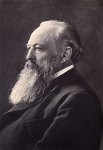In1870, along with his mentor Döllinger, Acton opposed the moves to promulgate the doctrine of papal infallibility in the First Vatican Council, travelling to Rome to lobby against it, ultimately unsuccessfully.[SUP][12][/SUP] Unlike Döllinger Acton did not become an Old Catholic, and continued attending Mass regularly; he received the last rites on his deathbed.[SUP][13][/SUP] The Catholic Church did not try to force his hand. It was in this context that, in a letter he wrote to scholar and ecclesiastic Mandell Creighton, dated April 1887, Acton made his most famous pronouncement:
But if we might discuss this point until we found that we nearly agreed, and if we do agree thoroughly about the impropriety of Carlylese denunciations and Pharisaism in history, I cannot accept your canon that we are to judge Pope and King unlike other men, with a favourable presumption that they did no wrong. If there is any presumption it is the other way, against the holders of power, increasing as the power increases. Historic responsibility has to make up for the want of legal responsibility. Power tends to corrupt, and absolute power corrupts absolutely. Great men are almost always bad men, even when they exercise influence and not authority, still more when you superadd the tendency or the certainty of corruption by authority. There is no worse heresy than that the office sanctifies the holder of it. That is the point at which the negation of Catholicism and the negation of Liberalism meet and keep high festival, and the end learns to justify the means. You would hang a man of no position like Ravaillac; but if what one hears is true, then Elizabeth asked the gaoler to murder Mary, and William III. ordered his Scots minister to extirpate a clan. Here are the greatest names coupled with the greatest crimes; you would spare those criminals, for some mysterious reason. I would hang them higher than Haman, for reasons of quite obvious justice, still more, still higher for the sake of historical science.[SUP][4]
Ref: https://en.wikipedia.org/wiki/John_Dalberg-Acton,_1st_Baron_Acton#cite_note-lmcone-4[/SUP]
Ref: https://en.wikipedia.org/wiki/John_Dalberg-Acton,_1st_Baron_Acton#cite_note-lmcone-4[/SUP]

